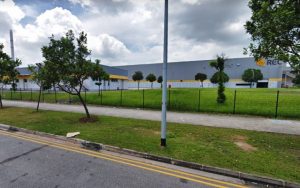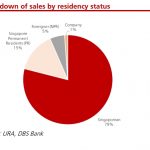CBRE announced on Jan 4 that it had brokered the sale-and-leaseback transaction for a 25-hectare site in Tuas South Avenue 14. The site Tuas South Avenue 14 accommodates an integrated industrial and warehouse facility with a total gross floor area of 1.6 million sq ft.

The site in Tuas South Avenue 14 was sold to LOGOS and 100% leased back to REC for 20 years for the conversion of polysilicon into wafers, solar cells and solar panels.
Table of Contents
Mr Rimon Ambarchi, Executive Director of Industrial and Logistics Services, CBRE, said, “We are delighted to start the new year strongly with the announcement of Singapore’s largest single-asset industrial transaction in the last year. Sold at S$585 million to LOGOS via a sale-and-leaseback agreement, leading solar firm REC will continue to produce solar panels at this highly advanced facility in Tuas.”
He added: “We have been experiencing strong demand from a wide variety of institutional investors for high quality industrial real estate in Singapore. These investors are attracted by the relatively strong yields that are still available in this strong core market.”
The site in Tuas South Avenue 14 is located next to the future Tuas Mega Port, which when completed in 2040, will house all of Singapore’s future container activities and handle up to 65 million standard-sized containers, an increase from the current 40 million.
JTC said in its report last year that the supply pipeline for warehouses and single user factories is mainly in the West Region, while factory stock is concentrated in the West, North East and North Regions. The successful brokering of the mega-site at Tuas South Avenue 14 comes at a time when tapering supply is coming on stream from 2019 onwards. The average rents and prices are expected to stabilise across all segments with this tapering supply.
The business park segment is expected to continue to outperform the general market given steady demand, while logistics/warehouse rents could potentially see some upside by year-end on the back of an expected reduction in vacant stock.
Investments in industrial property market rose in popularity following the cooling measures imposed on the residential segment in 2011 and 2013. Unlike residential property, industrial property is typically not an option considered by most Singaporeans unlessthey are an investor or business owner.
The pool of local buyers for the industrial property market therefore is much smaller. Furthermore, buying an industrial property is more complex and varied. It is also less speculative compared with residential property segment.
An important differentiation is that additional buyer’s stamp duty (ABSD) is not applicable for buyers of industrial property. This is a major reason for swaying potential buyers towards industrial properties.
Another key difference in buying from the industrial property market is that buyers are not able to use their savings in their Central provident Fund (CPF) to fund their purchase unlike for a residential property probably as unlike homes, these purchases are deemed non-essentials. This essentially means buyers should have enough cash to pay the down payment.
When buying an industrial property, it is important to look out for the condition of the amenities and facilities such as lift, toilets, maintenance of air conditioning, security, lighting, fire safety as you (or your tenant, or customer, or staff) will probably have to bear with the overall condition of such facilities. This is unlike residential properties where buyers only have to take into consideration their personal preferences and the fact that buyers will have some of these basic amenities in their homes.
Industrial properties in Singapore are typically leasehold, with the most common being 60-year ones. But there are industrial properties with 30-, 99-, or 999-year leases. Freehold industrial properties command a premium and are mostly situated in suburban areas.
The maximum loan tenure for purchases in industrial property market will depend on the remaining lease of the property. This typically stands at 30 years and generally they would be lower if the lease of the property becomes less.
The loan to value (LTV) is typically up to 80% for industrial property loan. Generally, banks offer a lower LTV for industrial property and are more stringent.
Total debt servicing ratio (TDSR) is another dampener for those who want to purchase a property from the industrila segment. TDSR applies when the buyer purchases an industrial property under company name, in that it applies on the individual director’s income if the company is an investment holding company or an operating company that is loss-making or does not have sufficient cash flow to servicing the repayment.
To buy an industrial property under company name where the company is well established with an existing operating business with strong financials, TDSR may be waived on the individual. However the director is usually required to become personal guarantors of the loan the company undertakes. Hence this may affect the director’s other purchases (e.g. residential property purchases due to the loading from the TDSR for guaranteeing a loan).
Some banks sometimes advertise 100 to 120% loans, but this is due to a combination of working capital as well as industrial property loans. This however applies only to companies with strong cash flow position.
The types of loans for industrial properties are different from residential properties as the banks’ considerations are more complex and varied. This is one major reason why anyone considering the purchase of real estate from the industrial property market should engage a mortgage consultant.
—
If you are searching for a warehouse, our Panel of Property agents and the mortgage consultants at icompareloan.com can help you with affordability assessment and a promotional loans. Just email our chief mortgage consultant, Paul Ho, with your name, email and phone number at paul@icompareloan.com.






